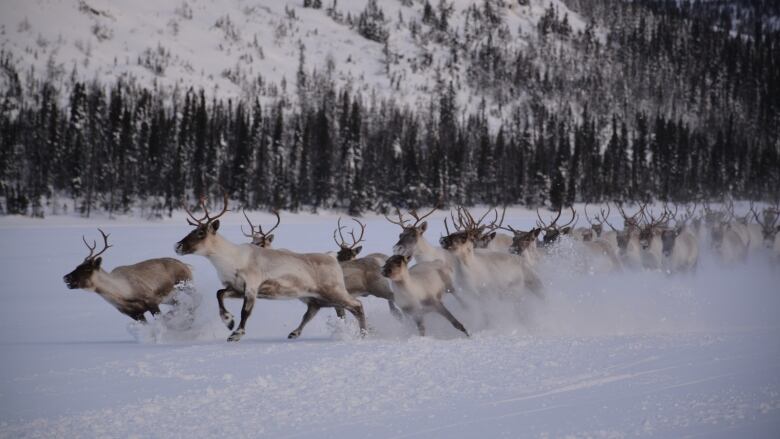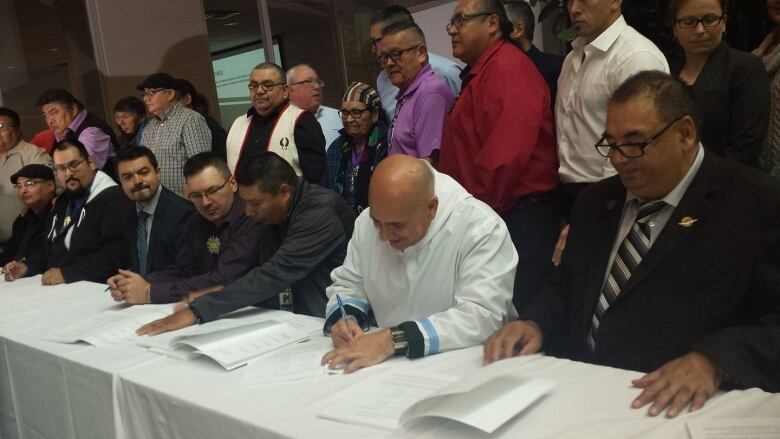Call for all-out hunting ban for George River caribou renewed by Nunatsiavut government
Latest numbers show herd has declined by 38 per cent in last two years

The Nunatsiavutgovernment is doubling down on its call for a complete ban on hunting caribou from the George River herd, following a call for the samefrom the Cree Nation in Quebec.
The latest numbers put the herd at 5,500 member, a decline of 38 per cent in the last two years.
Since 2001, 99 per cent of the herd has vanished.
"[It's] shocking," saidTony Andersen, theNunatsiavutGovernment's lands and natural resources minister.
"If they're not protected they will disappear, within maybe even five years."
If the population is to bounce back, he said,"it has to be an all-out protection and they have to be left alone to rebuild."
Not all Indigenous groups on board
It's not the first time the Nunatsiavut government has asked that the herd be left alone.
In January 2018, the Ungava Peninsula Caribou Aboriginal Round Table (UPCART), a coalition of Indigenous groups in Labrador and Quebec who hunt the threatened George River and Leaf River caribou herds, proposed a limited harvest of the George River herd for Labrador Indigenous groups.

But the Labrador Innuthought the numbers presented were too low and pulled out of UPCART. Grand Chief Gregory Rich told CBC News in Januarythe Innu would develop its own conservation plan for the herd.
When the latest count for the herd came out in September,the NunatsiavutGovernment"renewed its call for a zero harvest" to UPCART, Andersen said.The Cree Nation Government voted in favour of a complete hunting ban on the herd earlier this month, and the Inuit of Quebec have also echoed the call, Andersen said.
"We're starting to see people come on side."
Without it, not only would it be food for our bellies, but for our cultural well-being as well.- Tony Andersen
But it's still unclear where the Innu Nation stand.
"I very much believe ... that they are concerned about what's happening with the herd, and that they're going to be willing to work with us at the end of the day," Andersen said.
"Both us and the Innuforever have harvested from that herd. And without it, not only would it be food for our bellies, but for our cultural well-being as well. Just as important as food for the stomach."
Provincial government could help with enforcement
Andersen said his government believes the biggest thing impacting the herd right now is illegal hunting, and he'slooking to the Newfoundland and Labrador government to help with enforcement of the ban. He said the provincial government needs to step in with a stronger presence that announces a dedication to the protection of the heard.
"I'm not talking about thousands of officers to cover this land, but a presence."
On Friday, the provincial department of land resources applauded a newly releasedprogress report on woodland caribou preservation from the federal environment department, saying it is happy to see the federal government shift its focus from habitat preservation for the George River caribou.
"Unlike almost all other jurisdictions in Canada, caribou habitat in Labrador including that of the migratory George River herd in northern Labrador and boreal herds of southern Labrador is effectively pristine. The decline and continued low abundance of these herds has been driven by a combination of natural population cycles and unsustainable harvesting, rather than lack of critical habitat," said a statement from the provincial department.












_(720p).jpg)


 OFFICIAL HD MUSIC VIDEO.jpg)
.jpg)



























































































